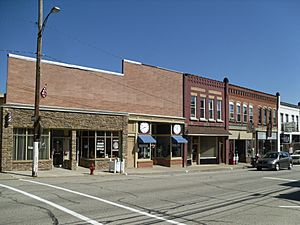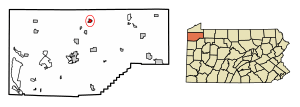Cambridge Springs, Pennsylvania facts for kids
Quick facts for kids
Cambridge Springs, Pennsylvania
|
|
|---|---|
|
Home rule municipality
|
|

Downtown Cambridge Springs
|
|
| Etymology: Cambridge, Massachusetts and nearby mineral springs | |

Location of Cambridge Springs in Crawford County, Pennsylvania
|
|
| Country | United States |
| State | Pennsylvania |
| County | Crawford |
| Settled | 1822 |
| Area | |
| • Total | 0.89 sq mi (2.30 km2) |
| • Land | 0.89 sq mi (2.30 km2) |
| • Water | 0.00 sq mi (0.00 km2) |
| Highest elevation
(at water tank in southwest corner of borough)
|
1,300 ft (400 m) |
| Lowest elevation
(French Creek at borough line)
|
1,130 ft (340 m) |
| Population
(2020)
|
|
| • Total | 2,583 |
| • Estimate
(2022)
|
2,339 |
| • Density | 2,916.67/sq mi (1,125.77/km2) |
| Time zone | UTC-5 (EST) |
| • Summer (DST) | UTC-4 (EDT) |
| ZIP Code |
16403
|
| Area code(s) | 814 |
Cambridge Springs is a small town, also called a borough, located in Crawford County, Pennsylvania, United States. It has a special "home rule" status, which means it can make some of its own local laws. In 2020, about 2,583 people lived there.
Contents
History of Cambridge Springs
Early Settlement and Name Change
The area that is now Cambridge Springs was first settled in 1822. It was named "Cambridge" after the city of Cambridge, Massachusetts. On April 3, 1866, it officially became a borough and was called Cambridgeboro.
In the late 1800s, something exciting happened: people discovered mineral springs in Cambridgeboro! These springs had water believed to be good for health. Because of these special springs, the town became famous. On April 1, 1897, the borough changed its name to Cambridge Springs.
A Popular Resort Town
Cambridge Springs became a popular resort town where people would come to relax and enjoy the mineral waters. Many hotels were built, including the famous Rider Hotel, which unfortunately burned down in 1931. The last of these grand hotels, the Riverside Inn, was a very old and important building. It was listed on the National Register of Historic Places in 1978, but it also burned down on May 2, 2017. Other historic places in town include the Cambridge Springs Bridge and the Amos Kelly House.
Chess History in Cambridge Springs
In 1904, the Rider Hotel in Cambridge Springs hosted a very important chess tournament. A famous chess player named Frank Marshall won this tournament. He even beat the World Champion at the time, Emanuel Lasker. A special move sequence used in chess, called an "opening," was played many times at this tournament. Today, it is known as the Cambridge Springs Defense.
Alliance College and Beyond
From 1912 to 1987, Cambridge Springs was home to Alliance College. This college was a big part of the town's life. In 1912, the President of the United States, William Howard Taft, even visited Cambridge Springs for the college's dedication. After the college closed, its site became the State Correctional Institution – Cambridge Springs, which is a correctional facility.
In the early 1900s, the town also became a popular spot for travelers, especially for those interested in meeting Leon Ray Livingston. He was a famous traveler and author who made Cambridge Springs his home base when he wasn't exploring.
Home Rule Status
On May 21, 1974, the people of Cambridge Springs voted to adopt a "home rule charter." This means that since January 5, 1976, the town has more control over its own local government and laws. Even though its official name is still the "Borough of Cambridge Springs," it now operates under its own special rules, not just the general Pennsylvania Borough Code.
Geography of Cambridge Springs
Cambridge Springs is located in the northern-central part of Crawford County. It is surrounded by Cambridge Township, which is a separate local area.
Two main roads, U.S. Route 19 and U.S. Route 6, pass through Cambridge Springs. These roads can take you north about 7 miles to Mill Village or south about 12 miles to Meadville, which is the main town of Crawford County. If you go north on US 19 for about 25 miles, you will reach Erie. Other state roads like Pennsylvania Route 99, PA 86, and PA 408 also connect Cambridge Springs to nearby towns.
The borough covers about 0.872 square miles of land. There is no large body of water within the borough limits. French Creek, which is a river that flows into the Allegheny River, runs through the northern part of Cambridge Springs.
Population and People
| Historical population | |||
|---|---|---|---|
| Census | Pop. | %± | |
| 1870 | 452 | — | |
| 1880 | 674 | 49.1% | |
| 1890 | 912 | 35.3% | |
| 1900 | 1,495 | 63.9% | |
| 1910 | 1,514 | 1.3% | |
| 1920 | 1,663 | 9.8% | |
| 1930 | 1,665 | 0.1% | |
| 1940 | 1,807 | 8.5% | |
| 1950 | 2,246 | 24.3% | |
| 1960 | 2,031 | −9.6% | |
| 1970 | 1,998 | −1.6% | |
| 1980 | 2,102 | 5.2% | |
| 1990 | 1,837 | −12.6% | |
| 2000 | 2,363 | 28.6% | |
| 2010 | 2,595 | 9.8% | |
| 2020 | 2,583 | −0.5% | |
| 2022 (est.) | 2,339 | −9.9% | |
| Sources: | |||
According to the 2010 United States Census, there were 2,595 people living in Cambridge Springs. The town had 675 households, with 484 of them being families.
The population density was about 2,976 people per square mile. Most of the people living in the borough were White (84.9%), with African Americans making up 12.8% of the population. Other groups included Native American, Asian, and people of two or more races. About 3.5% of the population identified as Hispanic or Latino.
About 19% of the people in Cambridge Springs were under 18 years old. The average age of residents was 36 years. For every 100 females, there were about 55 males.
See also
 In Spanish: Cambridge Springs para niños
In Spanish: Cambridge Springs para niños
 | George Robert Carruthers |
 | Patricia Bath |
 | Jan Ernst Matzeliger |
 | Alexander Miles |


